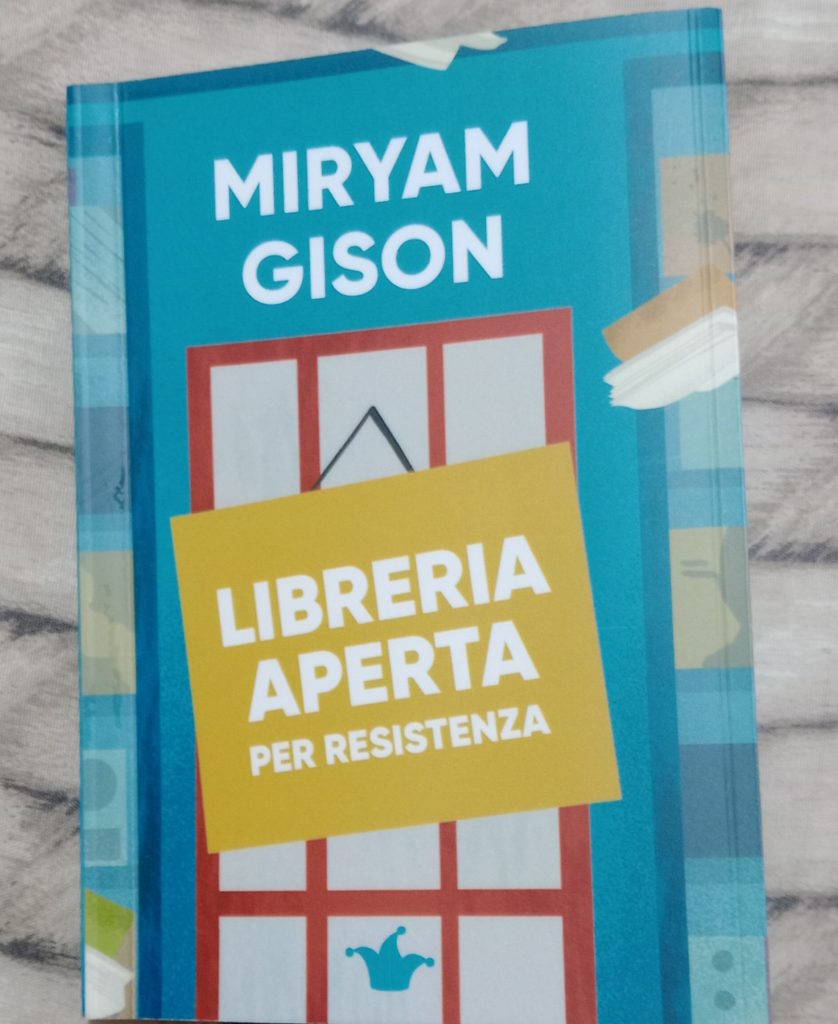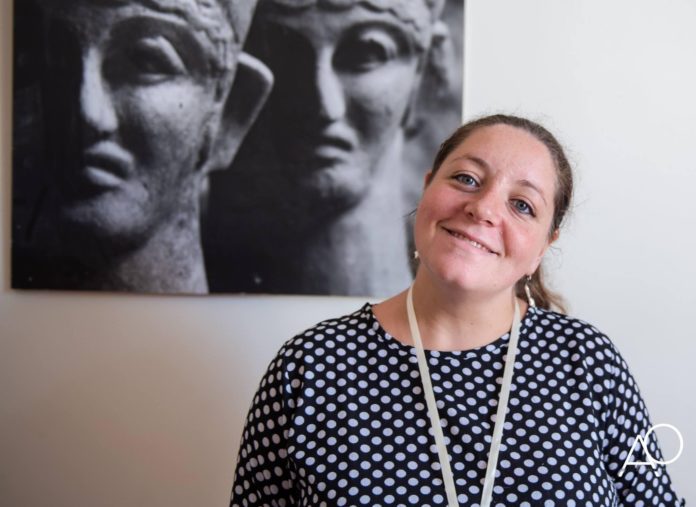Miryam Gison, classe 1986, di Napoli (foto). Ha studiato Filosofia all’università Federico II. Vive a San Giorgio a Cremano, nella città del grande Massimo Troisi dov’è presente un vero e proprio presidio culturale in cui nascono continuamente idee volte a un solo obiettivo: diffondere e difendere la cultura con tutto l’amore possibile.
Vive in un mondo di parole e di storie che racconta a chiunque passi a trovarla nella sua Bottega delle parole, una libreria indipendente, un punto di riferimento per grandi e piccini che possono imparare divertendosi. A 18 anni pubblica il suo primo libro “Diario di un’adolescente confusa” e dopo diversi anni decide di scrivere “Libreria aperta per resistenza”.

«Una libreria di paese. Un libraio, Antonio. Le bollette da pagare e il sogno che sembra infrangersi davanti a un mondo tecnologico. Ha ancora senso vendere libri nell’era dei BookTok? Hanno senso gli sforzi nell’organizzare eventi, letture, essere punti di riferimento per una comunità nell’epoca degli store online? Libreria aperta per resistenza è un manifesto, una storia di sopravvivenza, lo sguardo ai luoghi preziosi che i quartieri, le città, dovrebbero tutelare, invece di piangerne solo la chiusura». Ne parliamo con l’autrice.
Com’è nato questo libro?
«Questo racconto non nasce direttamente per la pubblicazione. Ho iniziato a scriverlo perché volevo partecipare a un concorso di brevi testi ironici. Poi mi sono accorta che mentre scrivevo avevo bisogno di far uscire altro, di mettere su carta dei sentimenti, delle paure, delle passioni e più andavo avanti, più mi rendevo conto che stava diventando la mia voce, ma anche quella di tanti colleghi librai; stavo raccontando una storia che è la NOSTRA storia, una scrittura individuale che diventava una voce plurale e collettiva»
A cosa ti sei ispirata per scriverlo?
«Come dicevo, non ho subito pensato alla pubblicazione – anzi ancora adesso mi sembra così bello e “impossibile” che forse non ho realizzato ancora – ero lì che volevo scrivere per questo concorso, che tra l’altro aveva un premio in denaro proprio della cifra di una fattura di eguale importo, che non sapevo come pagare ovviamente. Mi ero messa al computer a casa mia, che è per definizione il luogo più caotico del mondo, e avevo chiesto a mia figlia, la grande, di giocare con la piccolina e tenersi lontane da me. Le avevo anche promesso una fetta minima dell’eventuale vincita. La cosa divertente è che dopo pochissimo ho capito che non avrei vinto il concorso, perché ero uscita dal genere richiesto, e che quindi Giulia non sarebbe stata ricompensata. La ripago perciò in fama nominandola spessissimo. Scherzi a parte non mi sono ispirata a qualcosa in particolare, anche perché libri sui librai ce ne sono molti ma molto diversi secondo me da ciò che volevo rappresentare qui, però scrivendo ho applicato, in maniera inconsapevole, molto dello stile di Lorenzo Marone, soprattutto il suo modo di trattare ogni personaggio come un protagonista, una storia nella storia».
Vorresti trasmettere un messaggio a chi lo legge?
«Sì, decisamente. Il bisogno di lanciare il messaggio in verità è il motivo che mi ha spinto a pubblicarlo. Non ho la velleità di definirmi scrittrice e tra l’altro il raccontino è così breve che forse non ha neppure senso una sua pubblicazione, una vendita. Però mi sono accorta che chi viene in libreria, chi entra per quell’arco temporale di una chiacchiera, di un acquisto, non sa cosa c’è dietro. Non conosce la passione che muove i librai, non sa le lacrime che ci sono dietro a ogni giornata no, a ogni chiusura cassa complicata, non conosce la disperazione dei mesi in cui non riesci a pagare i fornitori. Ma soprattutto non gli viene detta la frustrazione del sentire il fallimento del proprio progetto, perché quando le cose economicamente non vanno, pensi che stai fallendo tu, che sei incapace di lavorare bene. Scusami se mi dilungo su questo punto ma vorrei far capire cosa si prova; chi lavora nel mondo della cultura promuove eventi principalmente e la comunicazione deve essere sempre positiva, non traspare nulla dei momenti bui, delle presentazioni con una persona sola, dei fine mese in cui a stento paghi l’affitto; per definizione sui social si promuove la vittoria, il successo. Lo facciamo tutti, lo fanno i colleghi. Quando tu quindi sei nella tua bella bottega e fai i conti a fine mese, ti dici che se non va la colpa è tua, gli altri librai hanno sale piene, vendite su vendite, gruppi di lettura fortissimi. E ti senti inadueguato. Ecco io ho voluto pubblicare questo racconto perché vorrei che nessuno di noi si sentisse solo e inadatto».
La tua libreria “La bottega delle parole” è il tuo angolo di libertà, aperta otto anni fa, ma dopo due anni stava rischiando la chiusura. Ti va di parlarcene…
«Quando inauguri una libreria è bellissimo, i riflettori sono tutti puntati, tutti a complimentarsi che apre un nuovo centro culturale. I fornitori ti aprono i conti, ti danno credito, siamo tutti felici. Soprattutto se come me inauguri a dicembre, il mese migliore commercialmente parlando. Ma poi arriva l’inverno, passa la novità e i fornitori ti chiedono ovviamente i soldi di ciò che hai preso. E lì capisci che hai voluto una bicicletta che probabilmente non sai pedalare. È successo a me due anni dopo l’inaugurazione della libreria. Mi sono sentita una fallita, avrei voluto chiudere tutto e ricominciare. Quello che però mi ha dimostrato che stavo fallendo sì ma economicamente e non professionalmente – che il problema sono i meccanismi economici del capitalismo e non la mia capacità lavorativa – ha del miracoloso. Una mia cliente dal nulla mi disse facciamo una raccolta fondi, chiediamo al comune di darti dei locali. Ecco avevo creato una comunità».
Miryam, tu sei anche cofondatrice della fiera “Ricomincio dai Libri“. Cosa rappresenta per te e com’è nata questa fiera che va avanti dal 2014?
«In verità la libreria nasce insieme a Ricomincio dai libri. Nel 2014 lanciammo questa follia con gli amici di Librincircolo, una fiera del libro in un territorio in cui mancavano fiere e festival letterari da anni. E lo facemmo partendo da San Giorgio a Cremano. Da Villa Bruno. Per farlo pulimmo i locali dell’ex libreria Vesuvio e le persone passavano congratulandosi che finalmente riaprissimo quella sede, una libreria. Io a Ricomincio dai libri devo tutto, devo l’entusiasmo, le batoste, una famiglia, le delusioni, i debiti, le risate. È il progetto più faticoso che potessi mettere in piedi. Per questo è la nostra scommessa più riuscita».
Progetti futuri?
«Per me domani non esiste. Ho un brutto difetto, quello del qui e ora. So lavorare in prospettive future, ma sono una di quelle che rimanda solo ciò che non le piace. I miei progetti sono tantissimi, tutti in corso d’opera e tutti insieme ahimè. Di sicuro c’è la promozione alla lettura nelle scuole di ogni ordine e grado, perché sono convinta che dobbiamo far tornare i libri a scuola, ma quelli belli, quelli adatti alle fasce d’età, ai gusti, ai linguaggi che cambiano. E poi ora che ho finalmente ripreso a scrivere –ebbene sì non è la mia prima pubblicazione ma ho abbandonato la scrittura a 19 anni dopo un primo libro “Diario di un’adolescente confusa” pubblicato da Graus – non voglio smettere più e sto realizzando un romanzo, uno molto personale che spero di poter mandare a qualche casa editrice di rilievo nazionale, se ovviamente ne varrà la pena. Inoltre mi piacerebbe lanciare una sorta di rubrica settimanale su un giornale, i racconti del libraio. Trovare un modo per permettere ad Antonio di continuare a raccontare. Chissà magari questa cosa può interessare a qualche testata…».
Books & beyond/ Miryam Gison and her bookshop open for resistance: ‘I always start again with culture. Passion for written pages is the future’
Miryam Gison, class of 1986, from Naples (photo). She studied Philosophy at the Federico II University. She lives in San Giorgio a Cremano, in the town of the great Massimo Troisi, where there is a true cultural garrison where ideas are constantly being born with one aim in mind: to spread and defend culture with all the love possible.
She lives in a world of words and stories that she tells to anyone who comes to visit her in her Bottega delle parole, an independent bookshop, a reference point for young and old to learn while having fun. At the age of 18, she published her first book ‘Diary of a Confused Teenager’ and after several years decided to write ‘Open Bookshop for Resistance’.
“A village bookshop. A bookseller, Antonio. Bills to pay and a dream that seems to be shattered in the face of a technological world. Does it still make sense to sell books in the age of BookTok? Does it make sense to organise events, readings, be a point of reference for a community in the age of online stores? Libreria aperta per resistenza is a manifesto, a story of survival, a look at the precious places that neighbourhoods, cities, should protect, instead of just mourning their closure”. We talk about it with the author.
How did this book come about?
“This short story was not born directly for publication. I started writing it because I wanted to enter a competition of short ironic texts. Then I realised that while I was writing I needed to get something else out, to put feelings, fears, passions on paper, and the more I went on, the more I realised that it was becoming my voice, but also that of many fellow booksellers; I was telling a story that is OUR story, an individual writing that became a plural and collective voice”.
What inspired you to write it?
“As I said, I didn’t immediately think about publication – in fact even now it seems so beautiful and ‘impossible’ that perhaps I haven’t realised it yet – I was there wanting to write for this competition, which by the way had a cash prize of exactly the same amount, which I didn’t know how to pay of course. I had put myself at my computer at home, which is by definition the most chaotic place in the world, and had asked my daughter, the big one, to play with the little one and keep away from me. I had also promised her a small share of any winnings. The funny thing is that after a very short while I realised that I would not win the competition, because I was out of the required genre, and therefore Giulia would not be rewarded. I therefore repaid her in fame by mentioning her very often. Joking aside, I wasn’t inspired by anything in particular, also because there are many books about booksellers but they are very different in my opinion from what I wanted to portray here, but in writing them I applied, unconsciously, a lot of Lorenzo Marone’s style, especially his way of treating each character as a protagonist, a story within a story”.
Would you like to convey a message to those who read it?
“Yes, definitely. The need to convey the message is actually the reason why I decided to publish it. I don’t have the ambition to call myself a writer, and besides, the story is so short that it may not even make sense to publish it, to sell it. But I realised that those who come to bookshops, those who come in for that time frame of a chat, of a purchase, do not know what is behind it. They don’t know the passion that drives booksellers, they don’t know the tears behind every bad day, every complicated cash-out, they don’t know the desperation of the months when you can’t pay your suppliers. But most of all they are not told the frustration of feeling the failure of their project, because when things fail financially, you think you are failing, that you are incapable of working well. Forgive me for dwelling on this point but I would like to make you understand what it feels like; those who work in the world of culture mainly promote events and the communication must always be positive, nothing transpires of the dark moments, of the presentations with only one person, of the end of the month when you barely pay the rent; by definition on social media you promote victory, success. We all do it, colleagues do it. So when you are in your nice shop and you do the accounts at the end of the month, you tell yourself that if it doesn’t work out it’s your fault, the other booksellers have full halls, sales upon sales, strong reading groups. And you feel inadequate. So I wanted to publish this story because I don’t want any of us to feel alone and inadequate”.
Your bookshop ‘La bottega delle parole’ is your corner of freedom. It opened eight years ago, but after two years it was in danger of closing. Would you like to tell us about it?
“When you open a bookshop it is wonderful, the spotlight is all on you, everyone congratulating you that a new cultural centre is opening. The suppliers open their accounts, they give you credit, everyone is happy. Especially if like me you open in December, the best month commercially speaking. But then winter comes, the novelty wears off and the suppliers obviously ask you for the money for what you took. And that’s when you realise that you wanted a bicycle that you probably don’t know how to ride. It happened to me two years after the opening of the bookshop. I felt like a failure, I wanted to close everything down and start again. What proved to me, however, that I was failing, yes, but economically and not professionally – that the problem was the economic mechanisms of capitalism and not my ability to work – was miraculous. A client of mine out of nowhere told me let’s do a fundraiser, let’s ask the municipality to give you premises. There I had created a community”.
Miryam, you are also the co-founder of the ‘Ricomincio dai Libri’ fair. What does this fair, which has been running since 2014, represent for you and how did it come about?
“Actually, the bookshop was born together with Ricomincio dai libri. In 2014 we launched this madness with our friends from Librincircolo, a book fair in an area where literary fairs and festivals had been missing for years. And we did it starting from San Giorgio a Cremano. From Villa Bruno. To do this we cleaned the premises of the former Vesuvio bookshop and people passed by congratulating us that we were finally reopening that venue, a bookshop. To Ricomincio dai libri I owe everything, I owe enthusiasm, beatings, a family, disappointments, debts, laughter. It is the most exhausting project I could set up. That is why it is our most successful bet”.
Future plans?
“For me tomorrow does not exist. I have a bad defect, that of the here and now. I know how to work in future prospects, but I am one of those who only postpones what she does not like. My projects are many, all in progress and all together alas. Certainly there is the promotion of reading in schools of all levels, because I am convinced that we must bring books back to school, but the good ones, the ones suited to age groups, tastes, and changing languages. And then, now that I have finally started writing again – yes, this is not my first publication, but I gave up writing when I was 19 years old after a first book “Diario di un’adolescente confusa” published by Graus – I don’t want to stop anymore and I am working on a novel, a very personal one that I hope to send to some publishing house of national importance, if of course it will be worth it. I would also like to launch a sort of weekly column in a newspaper, the bookseller’s tales. To find a way to allow Antonio to continue telling stories. Who knows, maybe this will be of interest to some newspapers…”










